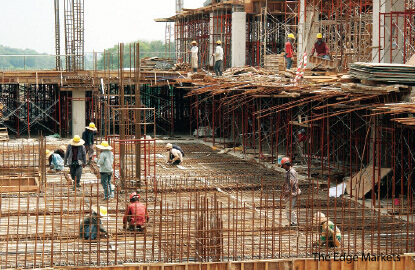
Some construction players bid below cost to survive — Gamuda

KUALA LUMPUR (Dec 6): It is no secret that the Malaysian construction market has slowed down markedly since the 14th general election in May last year, but the situation is so dire that certain contractors are putting in below cost bids just to keep their staff employed.
As such, Gamuda Bhd prefers to look overseas for more contracts and aims to derive half of its construction revenue and profit from international jobs over the next three years, said its managing director Datuk Lin Yun Ling after the company’s annual general meeting yesterday.
He said that Gamuda’s construction order book currently stands at about RM9.2 billion, with about a fifth of revenue and profit from overseas contracts. And as the infrastructure company has decided to make Australia its “second home market”, he indicated there would be “quite a few tenders in the pipeline”.
“We find that there are not enough big projects in Malaysia. Even if we look at big projects currently, more than half of them are actually done by Chinese contractors, and these Chinese state-owned enterprise contractors, if they want the project, they can easily tender even at a loss. So how are we going to compete with them? So we have no choice, we have to go overseas.”
While the Chinese contractors “are not exactly edging out” local contractors, their presence is a concern given that the volume of projects have slowed to a trickle, he said, now made worse by the stuttering Chinese economy. “So when things slow down there (China), they (Chinese contractors) will go overseas,” he observed.
Lin opined that countries such as Australia sees less competition from Chinese contractors because of their more stringent safety requirements and regulatory compliance.
“The Australian system there is very British, which means the design and safety standards, and contract law are very stringent. Nine out of 10 of their (Chinese) contractors cannot speak English. But here, the Chinese contractor can enter more easily,” he said.
On Gamuda’s Industrialised Building System (IBS) initiatives, Lin said the group’s two IBS factories are running at a production level of about 7,000 apartment units a year. But in order to be competitive, he said production has to be ramped up to above 8,000 apartment units a year.
“Our model is to go for competitive tenders. Up until the last general election, we were winning a few tenders and they were all under IBS construction. Since then we see the government housing programmes like affordable housing have either been shelved or slowed down.
“The market is very slow and very competitive now. The smaller contractors who survive, they have to submit below-cost bids, just to have some turnover to keep their people employed,” he said.
Lin said Gamuda’s IBS factories, however, are not underutilised at present as they produce for the group’s property development businesses, pending new contracts, including the one million affordable housing promised by the government.
“There are hardly any new roll-outs. All I can say is it is still a pledge,” he said.
This article first appeared in The Edge Financial Daily, on Dec 6, 2019.
Never miss out
Sign up to get breaking news, unique insights, event invites and more from EdgeProp.
Latest publications
Malaysia's Most
Loved Property App
The only property app you need. More than 200,000 sale/rent listings and daily property news.
